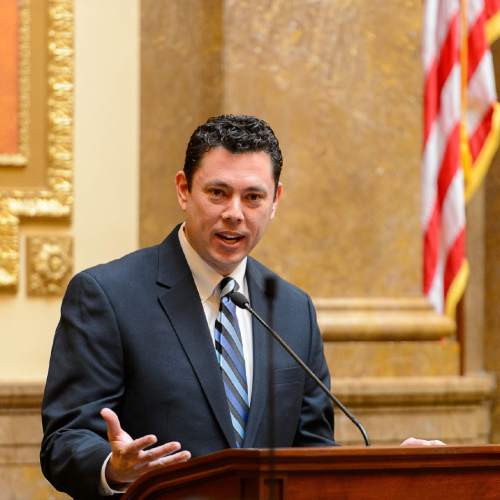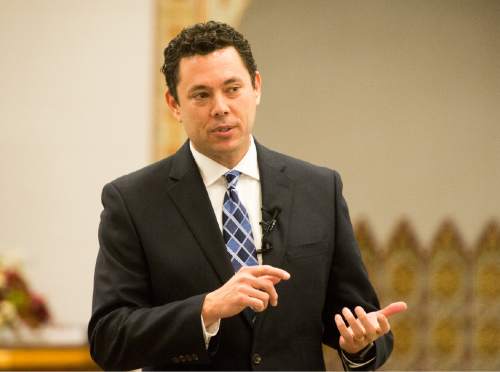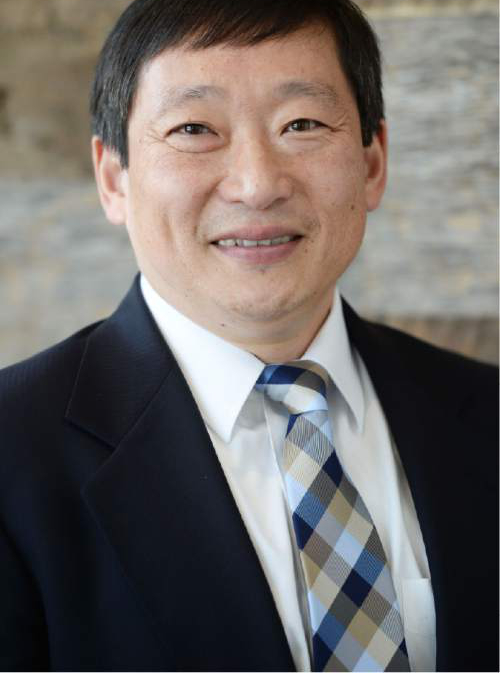This is an archived article that was published on sltrib.com in 2016, and information in the article may be outdated. It is provided only for personal research purposes and may not be reprinted.
It's probably not the type of support that presumptive GOP nominee Donald Trump would want.
Rep. Jason Chaffetz said Monday he will vote for Trump — mostly because of the conservative Supreme Court members he could nominate — but the Utah Republican plans to use his chairmanship of the House Oversight Committee to check and bridle Trump's wilder ideas and proposals.
"I'm going to be a kid in a candy store" if Trump is elected and pursues such proposals as restricting entry for Muslims into America, Chaffetz said. "Let me loose. We're going to have some very interesting hearings and more bipartisan support than ever if that happens."
Meanwhile, Chaffetz's GOP primary opponent, Chia-Chi Teng, said the way for Utah voters truly to change Washington would be to replace members of Congress — starting with Chaffetz — who don't balance budgets or control spending.
The two made the comments at a "candidate conversation" sponsored by the University of Utah's Hinckley Institute of Politics and Gardner Policy Institute. The opponents in the June 28 primary did not appear together, but rather in succession, to answer many of the same questions at the U.'s law school.
Chaffetz said he will vote for Trump. That "doesn't mean I will go out there and be able to defend everything he says." But when facing the possibility of electing Democrat Hillary Clinton instead, "It's no contest for me. I sort of come from the ABCs of politics, which is 'Anybody But Clinton.' "
He said Clinton has no moral compass and "will say whatever she needs to say at the moment in order to get elected. And I think the Supreme Court nominees she would put before the nation would dramatically alter our nation in a way that I just don't want to go."
Chaffetz said one reason Utahns should vote for him is because he could use his chairmanship of the House Oversight and Government Reform Committee — if Republicans retain a House majority — to hold hearings on and rein in any unsavory actions by a Trump administration.
"We're going to go after that administration just as hard as we would a Clinton administration," he said. "That is the true test of principle — if you are going to hold somebody accountable to the same standard no matter which party they are in."
Teng, a Brigham Young University professor and former Microsoft engineer, said he also will vote for Trump largely because he would nominate better people to the high court. Teng said while many talk about low approval ratings of Trump and Clinton, the numbers are even lower for Congress — and voters should make changes there.
"Here is a place we can make real difference: Have a balanced budget, cut spending and grow our economy," Teng said.
The challenger added that the rise of Trump helps show that "people really feel that they are disenfranchised and betrayed" by politicians. "You can vote for someone who can go in and do more business as usual, or you can choose somebody who is one of us," by voting for him instead of Chaffetz.
Teng accused his GOP rival of doing more talk than action, and pointed to the Public Lands Initiative he has been working on for years with Rep. Rob Bishop, R-Utah, seeking to work out where to protect the state's public lands and where to allow development. He complained no draft has been introduced.
"We hear a lot of talk, but in the end, where is the action?" Teng asked.
Chaffetz countered that the only reason President Barack Obama has not already created a proposed Bears Ears National Monument — which many local groups oppose — is because of hard work on the lands initiative seeking solutions that can please groups across the political spectrum. He said a final resolution is close.
Teng scolded Chaffetz for sponsoring a bill to make it easier for states to collect sales taxes from online purchases, which are already owed but often not paid. He called it cronyism that could help some big businesses that can afford the extra regulation, but would hurt smaller ones.
Chaffetz said it merely allows states to impose and collect their own sales taxes.
Both candidates agreed on some topics, including calling for abolishing the federal Department of Education and generally opposing tighter gun controls.
On firearms, Teng said he had many relatives in China killed during the Cultural Revolution. "I can appreciate the Second Amendment right because that's the power that people need to fight against tyranny. I know what could happen if people are not given that kind of power."
Chaffetz said, "I worry that putting additional limits on law-abiding citizens isn't going to actually solve the problem" with mass shootings.







